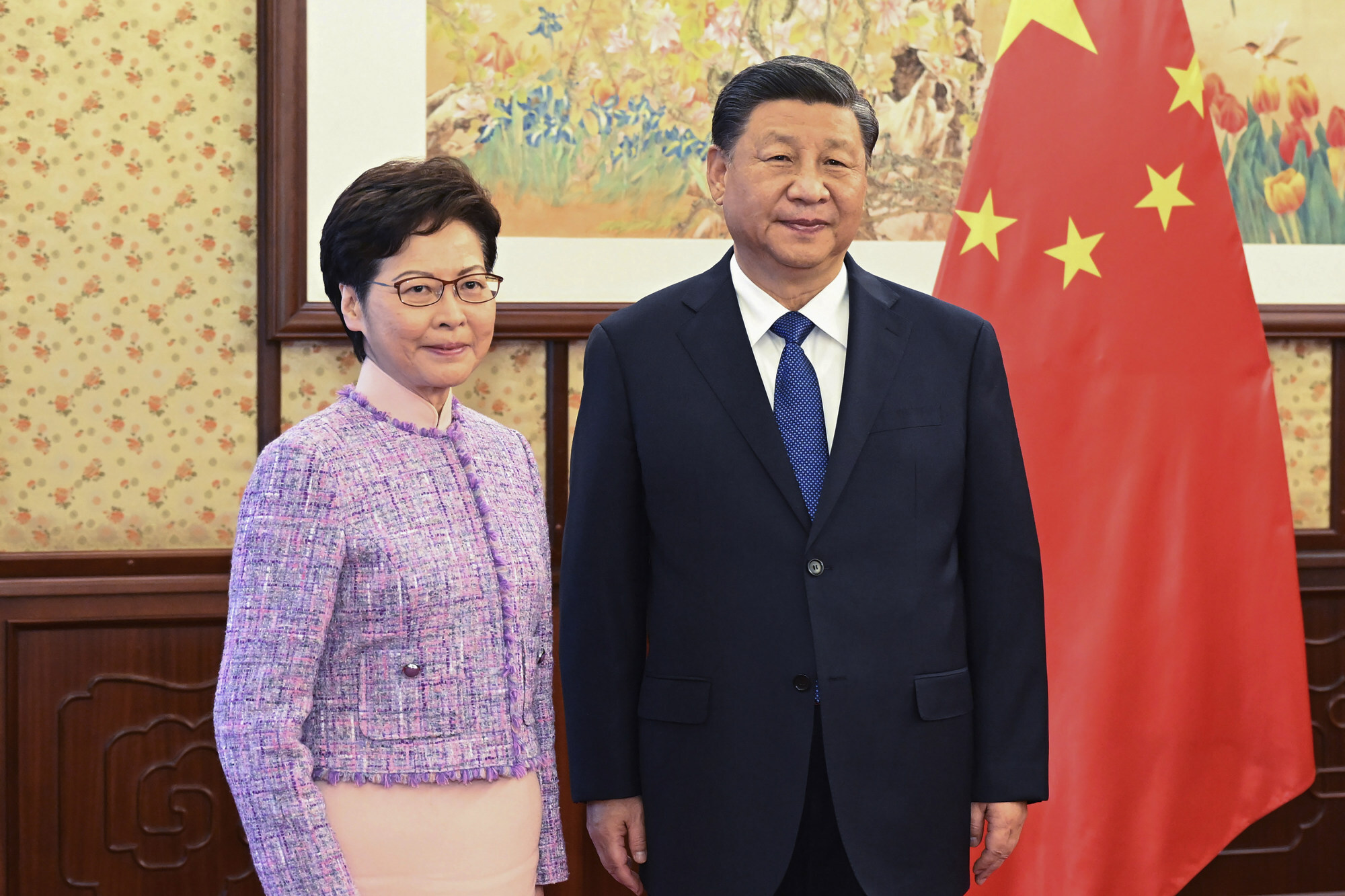
Hong Kong’s postponed chief executive election: what was Carrie Lam told in ‘closed-door’ Shenzhen meeting?
- Insiders describe series of high-level talks that led up to government’s announcement last Friday chief executive race would be delayed for first time
- Many factors played into decision, including avoiding ‘embarrassing’ scenario where hopefuls secured enough votes to run and government decided later to delay vote
A source said that discussions at the Shenzhen meeting prompted Lam and her de facto cabinet to decide three days later that invoking an emergency law would be “the most appropriate way” to postpone the election to May 8.

Doing so would then avoid requiring Beijing to deliver a top-down decision to extend Lam’s term past June 30 such as by having the apex of the national legislature issue a ruling, he said.
The revelation was in line with remarks by pro-Beijing heavyweight Lo Man-tuen, who said on Monday that based on his exchanges with “authoritative people”, Beijing had hoped to avoid making “drastic moves” to postpone the voting date beyond June 30.
Lam announced the unprecedented six-week delay of the leadership race on Friday afternoon, just two days before the nomination period was set to start, arguing the city could not afford “to be distracted” from the pandemic battle.
The government said it hoped the Omicron-fuelled wave of infections would be contained by May, although reported cases continue to set daily records, with 7,533 confirmed on Monday.
Will Beijing extend Hong Kong leader’s term if Covid-19 crisis runs past poll day?
A source close to the government revealed that Lam told the Executive Council, her de facto cabinet, on Tuesday that a “special meeting” could be held later in the week on the pandemic.
Another insider said the leader was then summoned to Shenzhen to attend afternoon talks with “mainland senior officials who oversaw the city’s affairs”.
The Hong Kong government is not legally required to disclose trips by the chief executive outside the city if they last less than 24 hours.
Xi delivered his rare warning through two local pro-Beijing newspapers on Wednesday, saying he had directed Vice-Premier Han Zheng – the top state leader in charge of Hong Kong – to relay to Lam that “an overriding priority” for the city government was to control the worsening Covid-19 outbreak.
Xi also ordered her administration to shoulder the “main responsibility” in containing the escalating fifth wave.
The same day, Xia Baolong, director of the State Council’s Hong Kong and Macau Affairs Office, presided over the first meeting of a tripartite coordination group in Shenzhen, where they discussed mainland China’s assistance in combating the health crisis.
On Thursday afternoon, executive councillors were informed about another special meeting to be held the following day, where the latest arrangements of the leadership race would be discussed.
In those talks on Friday, Lam was quoted as telling her executive councillors that if the government remained “too passive” and failed to move the nomination period back, it could face the embarrassing situation in which hopefuls had secured enough nominations from Election Committee members to run, but the pandemic forced the administration to delay the vote.
“It was the most appropriate arrangement for the government to ‘take the lead’ to postpone it by invoking local laws, instead of seeking help from the central government,” the insider quoted Lam as telling her advisers.
Another source familiar with the situation agreed with Lam’s approach in postponing the election, saying it was “not realistic” to expect the vote to go ahead as scheduled given the health crisis.
“If Hong Kong continued to hold the election [as scheduled] during the battle against the pandemic, how would the international community look on us?” the insider said. “Foreign investment and Hong Kong’s status as an international financial centre is at stake.”
What was Xi’s real message to Hong Kong’s leader on its Covid-19 woes?
The electoral office was informed of the postponement at very short notice, according to insiders.
In announcing the new election day last Friday, Lam warned that if the infection rate remained severe in May, she could invoke the Emergency Regulations Ordinance again to push the poll back to any day before the government term expired on June 30.
If voting were to be postponed for 42 days past May 8, the next possible election date would be June 19.
The city’s electoral law does not stipulate a minimum number of days to transition between governments.
But if the poll is pushed beyond July 1, the country’s top legislative body would need to formally extend the chief executive’s five-year term as stipulated in the Basic Law, the city’s mini-constitution. Lam has not said whether she will seek another term.
3 more hopefuls emerge for Hong Kong leadership race, but Lam remains coy on bid
Pro-Beijing heavyweight Lo, who is also vice-chairman of the All-China Federation of Returned Overseas Chinese, said Lam’s term was unlikely to be extended, as Beijing viewed such top-down moves as “too drastic”.
In an article published in the Chinese-language Ming Pao newspaper on Monday, Lo said allowing the outbreak to drag on would have unbearable consequences on society and disrupt the state leader’s visit planned for July 1, the 25th anniversary of Hong Kong’s handover from Britain to the motherland.
“The postponed time frame reflected [Beijing’s] demand to get the pandemic under control in two months,” he wrote. “This is a mission that Hong Kong government needs to accomplish in an all-out effort.”
Lo also noted that Beijing had always expected a fair, open and safe election, preceded by “normal campaigning” unencumbered by stringent social-distancing measures.



